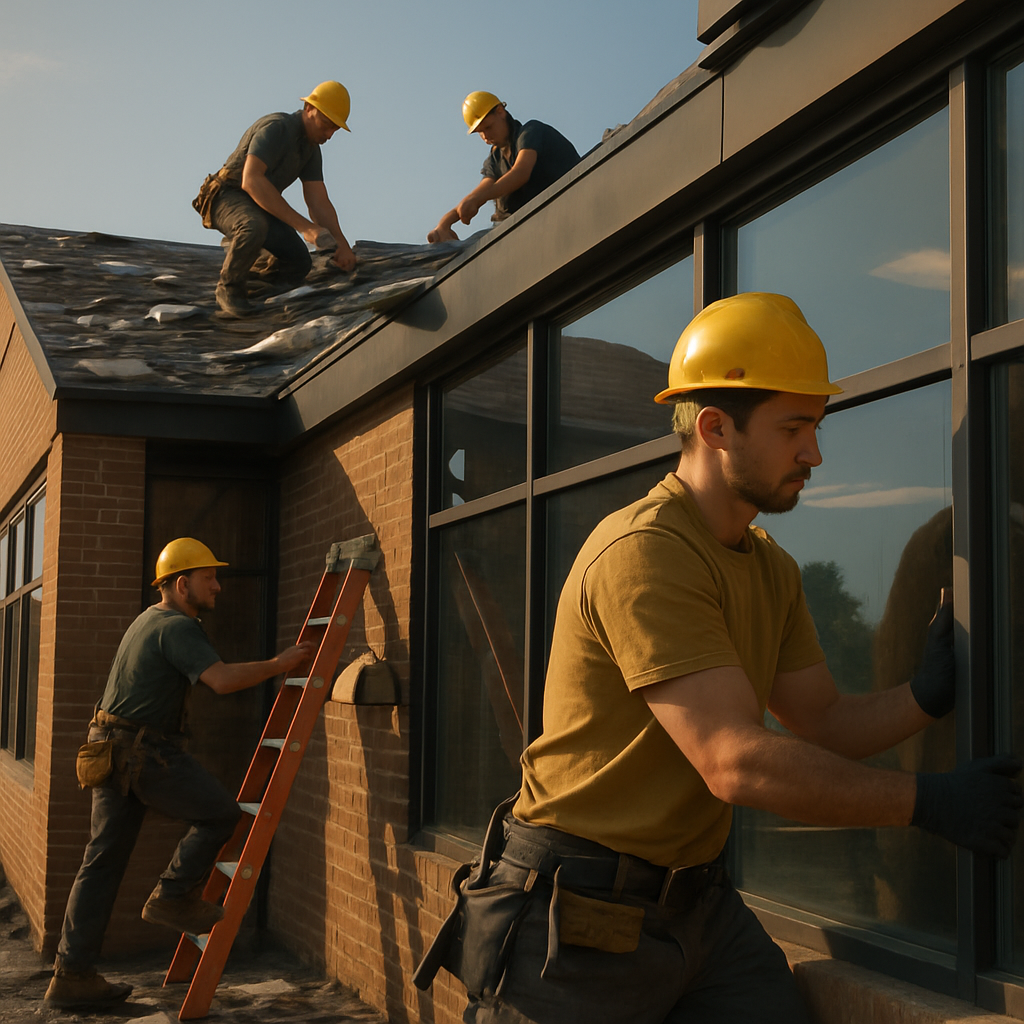Building Coverage: Safeguards Your Business Property Against Major Risks
Unexpected damage to your business property can threaten operations and your financial stability. Building Coverage protects your physical structure from common risks, giving you peace of mind and the confidence to move forward—no matter what happens.

When Building Coverage Makes the Difference
Real scenarios that show exactly when and how building coverage protects your business.

Minor Fire From Faulty Wiring
Sara, who runs a small bakery, discovered a smoky haze one morning—an electrical short had caused a minor fire overnight. Her building coverage handled the $11,000 repair bill for walls and floors damaged by smoke and fire suppression. Instead of losing weeks of business or paying out of pocket, Sara paid her $1,000 deductible and was back serving customers within days.

Severe Hail Storm Damage
After a powerful hailstorm, Jamie's office building roof and windows were badly damaged, leaving the interior exposed. Building coverage stepped in with $46,000 for roof, window, and water damage repairs. Without coverage, Jamie’s business would have faced closure, but the insurance covered repairs beyond her $2,500 deductible, letting her team get back to work quickly and safely.

Total Loss After Wildfire
During a wildfire, an entire building owned by Ethan’s logistics company was destroyed. Thanks to his building coverage, Ethan received a $725,000 payout to rebuild on the same site, after his $10,000 deductible. Rather than suffering a financial disaster and loss of livelihood, Ethan’s team resumed operations in a new facility within months.
Everything You Need to Know About Building Coverage
The complete picture: what's covered, what's not, and how to decide if you need it.
Building Coverage (Plain English)
Building coverage protects your business's physical property—including walls, roof, windows, and attached fixtures—against damage from perils like fire, wind, hail, or vandalism. When a covered event damages your building, this coverage helps pay for repairs or replacement up to your policy’s limit. The key thing to understand is that it protects your investment in your business property.
The Details That Matter
You’ll have a deductible (commonly $1,000–$10,000 per claim) that you must pay first. Coverage limits are based on the cost to rebuild your building—make sure your limit is high enough for today’s construction costs, not just what you paid years ago. Most policies pay replacement cost, but some use Actual Cash Value (ACV)—meaning depreciation is subtracted. Terms, exclusions, and some requirements (like security systems) may apply.
Building Coverage vs. Other Coverages
Building coverage is NOT the same as General Liability or Business Personal Property coverage. Building coverage covers damage to your business’s physical structure, while General Liability covers legal claims for injury or property damage to others, and Business Personal Property covers contents like inventory or equipment. You typically need all three for full protection.
Who Needs Building Coverage?
You typically need this coverage if:
- You own any commercial building (retail, office, warehouse, etc.)
- You are required by your lender or lease to insure the property
You might skip this coverage if:
- You don’t own the building (but you’ll still need coverage for your own business property and liability)
Setting Your Coverage & Options
You choose your coverage limit based on the cost to replace or rebuild your building today. Deductibles typically range from $1,000 to $10,000—higher deductibles reduce your premium but increase your out-of-pocket costs for a claim. Optional add-ons may cover debris removal, ordinance or law upgrades, or outdoor signs—talk to your advisor about customizing for your needs.
What's NOT Covered by Building Coverage
This coverage does NOT cover:
- Normal wear and tear: Gradual deterioration over time isn’t covered.
- Earthquake & flood: These require separate specialty policies.
- Employee theft/Crime: Typically excluded from property coverage and handled by separate crime insurance.
For these situations, you'd need separate earthquake, flood, or crime insurance.
See Your Price with Building Coverage Included
Now that you understand building coverage, see how affordable protection can be with personalized quotes from 26+ carriers.

Your Local Coverage Experts
1,430+ customers trust our expertise to explain coverage clearly and find the right protection for their business property needs.
4.9/5 Stars
Google Reviews from real customers, just like you
97% Retention
Customers stay with us year over year over year
Independent
We work for you, not insurance companies
Local
Fort Collins owned & operated since 1992
How Building Coverage Actually Works
Understanding exactly what happens when you file a building coverage claim—from start to finish.
The Claims Process
- Report the Incident: Contact your insurer as soon as you discover damage. Provide details and photos to start your claim.
- Assessment and Estimate: An adjuster evaluates the damage and verifies coverage, then provides a repair or rebuilding cost estimate—usually within days.
- Repair Authorization: Once approved, you can choose a contractor. The insurer arranges prompt payment for repair or rebuilding work.
- Settlement: You pay your deductible, and the insurer pays covered costs up to the policy limit. You'll get support until repairs are complete and your building is back to normal.
What You Pay
Your deductible—typically $1,000 to $10,000 per claim—is what you pay first in any covered event. Your premium buys peace of mind knowing your property is protected. Higher deductibles mean lower monthly costs, but make sure you could actually pay your deductible when disaster strikes.
Timeline
Straightforward claims (like minor fire or storm damage) are often resolved within two weeks. Complex claims involving large losses, code upgrades, or rebuilding may take several months. Most customers find the process smooth and well-communicated. The key is prompt reporting—the sooner you file, the faster you’re on the road to recovery.
What Building Coverage Actually Costs vs. What You Risk
Understanding the real financial impact: what you pay for coverage vs. what you risk without it.
Small Kitchen Fire
Annual Coverage Cost: $1,200
Scenario: Fire damages a back-room break area in a small retail shop.
Without Coverage: $9,500 out-of-pocket repair bill
With Coverage: $1,000 deductible (plus your annual premium)
Protection Value: $8,500 saved in this scenario alone
Major Storm Damage
Annual Coverage Cost: $2,200
Scenario: Windstorm blows out windows and damages roof on a medium office.
Without Coverage: $44,000 in repair costs
With Coverage: $2,500 deductible (plus your annual premium)
Protection Value: $41,500 saved
Total Loss Event
Annual Coverage Cost: $3,900
Scenario: Complete destruction from wildfire; building must be rebuilt from foundation.
Without Coverage: $850,000 out-of-pocket
With Coverage: $10,000 deductible (plus annual premium)
Protection Value: $840,000+ saved and your business can recover
The Economic Reality
For most owners, building coverage costs $100–$350 per month—less than many business utility bills. One incident without coverage could cost tens or hundreds of thousands of dollars, which could take years to recover from financially. The math is simple: building coverage pays for itself the first time you need it, and may be the difference between survival and closure after disaster.
4 Costly Building Coverage Mistakes to Avoid
Learn from others' experiences—avoid these common errors that can leave you unprotected when you need coverage most.
Underestimating Replacement Costs
Many businesses set their coverage limit based on purchase price instead of the cost to rebuild. If your building costs more to replace than your coverage limit, you’ll pay the difference out-of-pocket. Always insure for current construction costs, not just what you paid years ago.
Choosing a Deductible That’s Too High
Opting for the largest deductible to cut your premium can backfire if you can’t actually pay it during a claim. This can delay repairs and put your business at risk. Choose a deductible you can cover comfortably—even when cash flow is tight.
Assuming All Risks Are Covered
Some business owners believe building coverage is “all risk” insurance. Flood, earthquake, and gradual wear and tear are typically not covered. Talk to your advisor about specialty policies if you face these risks.
Not Updating Coverage Annually
Renovations, additions, or rising building costs can leave your insurance limit too low. If you haven’t reviewed coverage in more than a year, you could be underinsured. Schedule annual policy reviews to keep protection current and aligned with your property’s true value.
Find answers to your most pressing insurance questions right here.
Explore Your Coverage Options
Discover the best insurance coverage tailored to your individual needs and protect what matters most.

